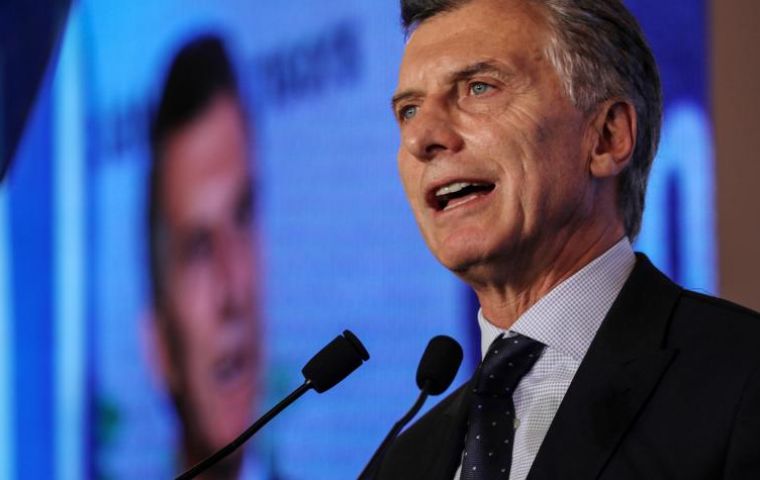MercoPress. South Atlantic News Agency
Argentina's economic activity dropped 2.6% in 2018, says Indec
 The areas which suffered the most significant blow were wholesale and retail which dropped 15.7%, followed by manufacturing, 14.2% and construction, 12.7%
The areas which suffered the most significant blow were wholesale and retail which dropped 15.7%, followed by manufacturing, 14.2% and construction, 12.7% Argentina's economic activity fell 2.6% in 2018 versus the previous year, government statistics agency Indec said on Wednesday, underscoring the turmoil that dragged the country into recession last year.
In December, monthly economic activity was 7% lower than the same month the prior year, following a 7.5% dip in November. The monthly data is seen as a leading indicator of Argentina's gross domestic product (GDP) growth.
The numbers are in line with previous estimates following the turbulent fourth quarter when the Argentine currency lost half its value against the dollar plunging the economy into recession. In effect the government had anticipated a fall of 2.5%, the Central bank, 2.4% and the IMF, 2.6%. Likewise with the 7% drop in December.
The areas which suffered the most significant blow were wholesale and retail which dropped 15.7%, followed by manufacturing, 14.2% and construction, 12.7%.
Last year's drought that halved grain production, the currency devaluation and soaring interest rates, were the worst since president Mauricio Macri took office in 2015. At the beginning of 2018, the Macri administration had forecasted a 3.5% expansion.
However Argentine Finance ministry sources estimate that December could have marked the lowest point of the current recession, and recovery can be expected in months ahead.
Of the fifteen production areas during December only a few showed a positive performance, agriculture and livestock were up 4.7%, education improved 1%, while social and public health services remained almost stale with a 0.4% plus. The twelve remaining continued sliding during December.
Power, gas and drinking water production was down 6.8%; fisheries 4.8%; hotels and restaurants, 3.5%; mining and quarries, 1.8%; financial intermediation, 3.4% and real estate operations, 2.1%. The rest of activities hovered with a loss of 1%.
Consultants Ecolatina, considered one of the most reliable in Argentina describe the 2018 performance as the worst recession since 2009, with a strong hangover into this year. To this must be added the uncertainties of the presidential election, which makes recovery more fragile.
This despite the expected greater crop, which should add a one percentage to overall growth, plus a surge in production for most of those sectors which have benefited from the significant devaluation of the Peso and the recovery of the Brazilian economy. However the fall of the domestic market as a result of a weakened consumption and investment, plus the increase of public utility rates and foreign exchange instability, reflected in a lower (3.5%) purchasing power of salaries, will also have a determining influence.




Top Comments
Disclaimer & comment rules-

-

-

Read all commentsHey Kamerad/Komrade Rique, “your country” won't be attacking anyone now, an ignominious prospect from your jaded point of view. Bummer, eh? Not from mine... :D
Mar 03rd, 2019 - 10:17 am 0@imoyaro
Mar 04th, 2019 - 03:31 am 0Hey, buddy: whatever you are smoking is not helping. Stop that, drink tap water for a while -- you will soon begin to feel better.
Funny, Kamerad/Komrade, I remember very well “your country” threatening the Uruguayans when they wanted to install that wood processing plant on the Uruguay River. Indeed you tried a blockade, and I remember at the time the little matter of military exercises involving troops using rubber “boats.”(Face it you couldn't afford real landing craft.) You claimed the Uruguayans were polluting the river, but of course, Argentina was in fact the source of the pollution. Naturally, your complaints were thrown out of the International Court of Justice, and the Uruguayans continue to operate the plant. Really, Kamerad/Komrade, have you actually begun doing meth? Now THAT would be true Social Justice! :)
Mar 04th, 2019 - 09:00 am 0https://en.wikipedia.org/wiki/Uruguay_River_pulp_mill_dispute
Rique! Payaso! Vos Sos El Mentiroso!
Commenting for this story is now closed.
If you have a Facebook account, become a fan and comment on our Facebook Page!